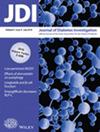Alcohol consumption, alcohol-metabolizing enzyme genotypes, and glycemic control in type 2 diabetes: Sex-specific findings from the Fukuoka Diabetes Registry
Abstract
Aims/Introduction
The sex-specific association between alcohol consumption and glycemic level and whether the association differs by genetic susceptibility to alcohol is unclear. The present study aimed to examine the association of alcohol consumption and genetic variants in alcohol-metabolizing enzymes with glycemic level, as well as their sex differences, in East Asian individuals with type 2 diabetes.
Materials and Methods
In total, 4,923 Japanese individuals with type 2 diabetes were included. Participants were classified based on alcohol drinking status, alcohol consumption amount (<20, 20–39, or ≥40 g/day), and ADH1B (rs1229984) and ALDH2 (rs671) genotype, and the associations with HbA1c levels were examined cross-sectionally.
Results
In men, compared with never drinkers, an increase in the alcohol consumption amount was associated with a decrease in HbA1c levels (P for trend <0.001). By contrast, in women, a mild-to-moderate consumption amount (<20 g/day) was associated with decreased HbA1c levels, whereas ≥20 g/day consumption was associated with increased HbA1c levels, indicating a J-shaped relationship. Regarding the association with genetic variants in alcohol-metabolizing enzymes, HbA1c increased linearly with an increasing number of A alleles in ALDH2 (P for trend <0.001). However, the HbA1c level did not show a significant trend across the ADH1B genotype. The association between alcohol consumption and HbA1c levels was not modified by genetic variants in ADH1B or ALDH2.
Conclusions
These findings highlight the importance of a sex-specific approach to alcohol drinking habits in managing glycemic control for individuals with type 2 diabetes, irrespective of genetic predisposition to alcohol metabolism.


 求助内容:
求助内容: 应助结果提醒方式:
应助结果提醒方式:


